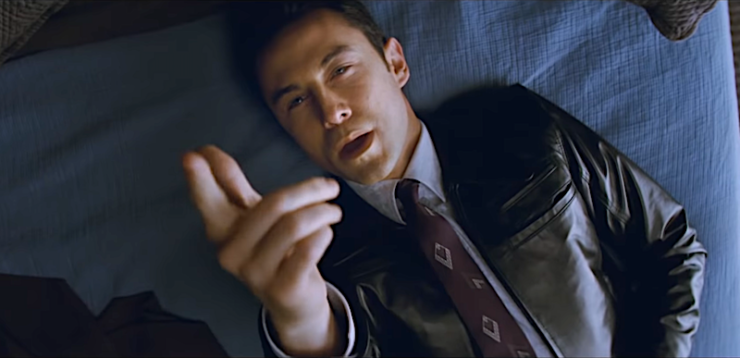Like approximately 2 billion of you, I went to see Joker last month. And as the ensuing conversations about The State of Society and Is Violence Ever Justifiable and Angry Men and oh yeah What About The State of Cinema and Wait, Batman Canon! swirled around, I realized that the biggest disappointment for me is that the film simply did not work as the supervillain origin story it purported to be. Despite Joaquin Phoenix’s goddamn superb performance, the film wallowed too much in its own in misery for two and a half hours, and where it simply did not work was as a supervillain origin story.
But there are two other films that take the rise of supervillainy seriously: Unbreakable, a dark tale that pre-dates the current wave of comics films, and Looper, a time-travel story that hides its super-powered villain till the final act.
Joker: In Which The Real Villain Is Fatalism
I know, a lot of people dug Joker for various reasons. (I even understand some of them.) For my part, literally Taxi Driver and Midnight Cowboy were two of my favorite movies in middle school, I’ve seen almost all of Scorsese’s oeuvre. But favorite Joker will always be Heath Ledger because I like the “possibly supernatural agent of chaos” angle, and I think it’s irresponsible to farm out all the emotional work in a film (like Joker does) to Black women.
I’m not belittling Arthur, who is an abuse survivor with a poorly-diagnosed mental illness. But as we watch abuses pour down on him, and as all of his tentative holds on society snap, there’s no point at all where there might be a better future. There’s no point where he makes a real choice to become a villain. Someone else presses a gun on him, his first murder is self-defense, and everything just kind of Katamari Damacys from there. As a supervillain origin story, Joker bludgeons us with so many terrible moments that his turn feels preordained, but then if you think about the film later, you start realizing that while he’s having some Very Bad Days, but his bad days are decidedly better than many of the other people in the film. What about his neighbor, the single mom who maybe gets murdered at the end? (And yes, the director has since said this isn’t the case, but I read a lot of conversations about the film in the days after its release, across a lot of different corners of the internet, and almost all of those viewers came away thinking Arthur had murdered the woman and her kid—which obviously informed their interpretations of the film as a whole.) What about his social worker, who gets badly paid to try to help people who are shitty to her, and then gets laid off in the end anyway? What about his coworker, Gary, who is a little person working as a clown (that HAS to set him up for abuse), who witnesses Arthur murder another coworker—like, where is that guy’s origin story? We know going in that Arthur will become the Joker, but the film simply presents his turn to capital-E Evil without making it unique enough to justify it.
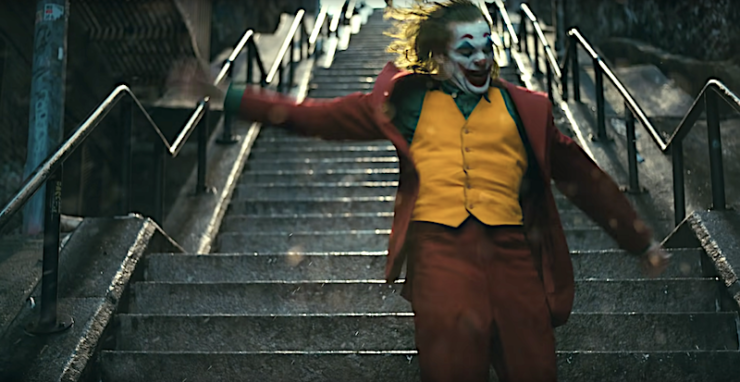
Unbreakable: A Villain In Plain Sight, But Also Too Hidden?
Unbreakable premiered a few months before Bryan Singer’s X-Men launched our current wave of comics films, and presented us with a new and original canon. Much of the press around the film focused on the idea of it as an adult reinvention of the superhero film, folding in nicely with the “comics aren’t just for kids anymore!” argument that certain people used to freak out over. It opens on the birth of Elijah Price, seen in a mirror. Two beaming shop ladies usher a doctor into a department store dressing room, where a woman has just (unexpectedly, I assume) given birth. The baby is squalling, mom seems fine, it’s a joyful moment—at first. Until the doctor realizes that Baby Elijah’s arms and legs are broken. The crying we’ve been hearing is not a newborn taking its first lungfuls of air, it’s a baby in terrible pain.
Cutting to the present day, we meet David Dunn (Bruce Willis), as he takes his wedding ring off to flirt with a much-younger woman on a train. This, too, is seen at a remove: the interaction plays out through the eyes of a little girl in the row ahead of them, as she swivels her head to look at them through the gap in the seats. In addition to framing the scene like comics panels (which, chef’s fuckin’ kiss, M. Night) it introduces us to our protagonist—our hero—in a deeply immoral moment. When adult Elijah Price (Samuel L. Jackson) appears a few scenes later, we know that he has overcome hardship and disability (and presumably racism, though this isn’t dealt with explicitly) to become a successful comics art dealer. In contrast, David has alienated his wife, tried to cheat on her, and is planning to ditch her and their child to move to New York.
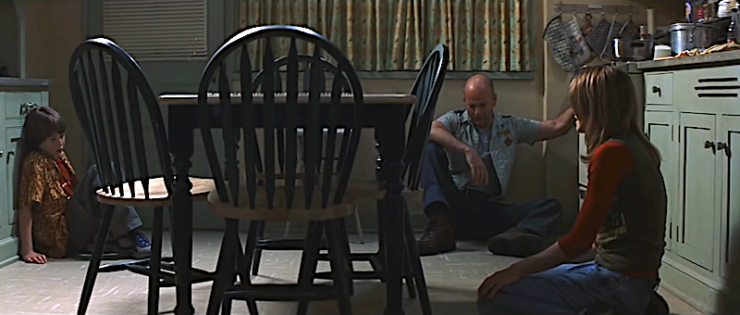
Shyamalan is showing us that Elijah has been born into a life of pain, while David, white, seemingly healthy, able to afford a home and a family, is choosing to act like a tool. He takes pains to show us that, while some people think he’s a crackpot, Elijah is actually right. David can bench press hundreds of pounds! David is actually somewhat psychic, and able to sense evil! And with Elijah’s encouragement, David finally starts accessing his powers and becoming the hero he was born to be. There is every indication that David is embarking on a life of IRL superhero-ing, thanks solely to Elijah’s intervention.
The only hints that anything might be amiss is in Elijah’s ludicrously sweet threads and bomb-ass car. But even there—we already know his mom is stylish, and that the two of them favor bold purples and oranges. We also know that he needs a special car with lots of protective cushioning, because of his osteogenesis imperfecta—so obviously if you have to customize a car, you’re going to go for a cool 50s-style one. Who the hell would bother customizing an Acura? So these don’t really function as clues that any reasonable person would pick up on. Elijah doesn’t get enough screentime for us to catch his hints that there’s a years-in-the-making nefarious plot, and Shyamalan simply doesn’t lay the groundwork for his big twist ending. Which means that when we learn that Elijah has been actively turning himself into a supervillain, and that he was only helping David in order to become the nemesis to a hero? On the one hand it’s cool, but it’s so emotionally manipulative on the film’s part that I feel like a chump for thinking it’s cool.
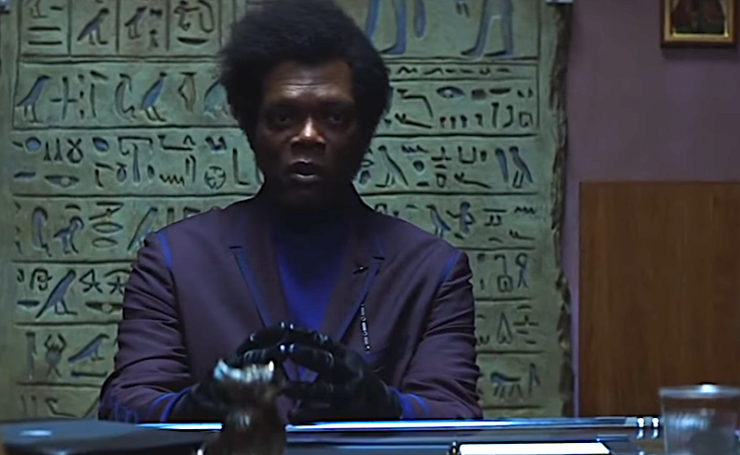
Looper: Cards On The Table/Sleight of Hand
In contrast to Unbreakable’s dour realism, Looper lets us know we’re in a fantastic universe within the first few scenes. We’re dropped into Kansas City in 2044, and told that time travel exists in the future, but is highly illegal. “Loopers” are hired hitmen who kill people in their present, thus negating them from the future, and that in the end each Looper “closes their loop” by killing their future self—which makes for a decidedly bittersweet retirement party. So we already know we’re in a sci-fi tale, but then in the midst of all this information, our protagonist, a Looper named Joe, casually mentions that 10% of the human population are born with mild telekinesis. This is a world where supernatural powers exist… but, like everything else in this world, it’s turned out to be a disappointment. Most people just use it as a parlor trick for first dates: “When it first appeared we thought we were gonna get superheroes, but this is it. Just a bunch of asshole think they’re blowing your mind floating quarters.” By telling us extraordinary powers exist, but then waving superheroes away, writer-director Johnson gives us a false sense of security that a superhero story is off the table. (But then again, only if we believe Joe, a small-time hitman in a low-rent city, with a decidedly limited perspective on life.)
As the story unspools, we mostly follow either this Young Joe of 2044 (Joseph Gordon-Levitt), or his future self (Bruce Willis) as they crash through their life as a hitman and sometime junkie. Another Looper lets his future self live long enough to learn about the Rainmaker, a crime boss in the future who has taken over every syndicate, and is actively closing every loop. Apparently the future is a nightmare because of this man.
We learn about the Rainmaker about ten minutes into the film, but it’s just one tiny fragment of information—the name of a mob boss—buried in a scene where Joe has to decide whether to hide his best friend, who has failed to close his loop. (This, uh, does not go well.) The Rainmaker is not mentioned again until Joe fails to close his own loop, seemingly a few weeks later. There’s a rumor that the Rainmaker turned evil because he “saw his mama shot” (but that’s just one theory among several) and apparently no one can account for his sudden rise to power. And then we, and Young Joe, learn that Future Joe is on a quest to find and kill the Rainmaker. Who, as it just so happens, was a vulnerable little boy growing up in Kansas City in 2044.
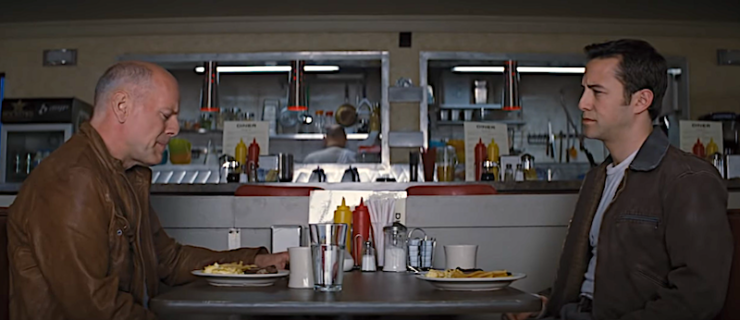
Now, this would imply a Terminator-style scenario, wouldn’t it? The two Joes will team up to hunt down the Rainmaker, save Joe’s wife, save the future for humanity. But that’s not how this plays out at all. First of all, Young Joe and Future Joe fucking hate each other, and that doesn’t change over the course of the film. And while Future Joe’s intention might seem noble (kill the Rainmaker, save the future) he’s really only doing this to save his own future wife. Everyone thinks they’d be able to kill Baby Hitler, but as we watch Future Joe stalk elementary-school-aged little boys (killing one and terrifying the other one’s mother) I think most people will begin to question Future Joe’s actions, motivations, and basic decency.
Meanwhile, Young Joe manages to get the location of the third potential Rainmaker, and finds a sugar cane farm, a precocious little boy, Cid, and his tough-but-exhausted mother, Sara, who appreciates Joe trying to help them, but tells him to keep himself and his guns the hell away from her boy. At first Cid just seems highly intelligent and mature for his age, but then we learn what happens when he throws a temper tantrum: the walls shake, everything in the room floats in the air, his screams become impossibly loud, and Sara locks herself in a safe to protect herself.
Sara wasn’t protecting Cid from Joe. She was protecting Joe from Cid. Cid becomes the Rainmaker because he has real, full-fledged superpowers, the superpowers Joe told us never came to pass. The Future is a nightmare because a supervillain is slowly taking over the world.
Now when this reveal hits we’re one hour and eighteen minutes into the movie. The plot abruptly shifts gears from telling a time travel yarn to being a serious, violent, adult supervillain origin story. But here’s why I think it works better than either Unbreakable or Joker: Cid actually gets a choice in his villainy. His life isn’t sugarcoated: he lives in a post-collapse U.S., on a farm with his young single mom. There’s not much money. It’s strongly implied that he accidentally killed his aunt—the woman he thinks was his mother. He’s very lonely and confused. And in the midst of that, two different men show up in his life bringing turmoil and violence. He sees his mother held hostage at gunpoint and, again accidentally, kills her attacker with his powers.

He gets shot in the face by Future Joe, and in his pain he begins to turn his powers on him in retaliation—but it’s obvious that if he really lets go, Sara will die too. She talks him down, but that frees Future Joe up to shoot her. Young Joe, watching all of this across the cane field, realizes that this is the crucial moment. Almost killing his mother? Seeing her killed anyway when he chose not to use his powers? It’s this feedback loop of anger and vengeance that turns Cid into the Rainmaker. Killing his mother and orphaning himself will set him on a path of vengeance and hatred. If Sara lives there might be hope for the world—or more than hope, because what if Cid grows up using his powers to help people, the way Sara’s been teaching him?
Johnson sets this up, and then knits his time travel scenario into his supervillain story by having Young Joe commit suicide, thus winking Future Joe out of existence before he can kill either Sara or Cid. The super-powered child is left to his farm and his mother, with some traumatic memories, yes, but also with the memory that he successfully controlled his power and didn’t hurt his mother, who was then able to protect him. If he remembers Joe at all, he may only remember Young Joe, the nice man who protected him. There’s a new path in front of him now, and the future has been changed.
Unbreakable makes it seem as though we should be rooting for Elijah Price, and questioning David, only to yank the rug out from under us. Joker asks us to empathize entirely with Arthur, to the point that we don’t really see how much other characters are suffering. But in Looper we see from the outset that Joe is not a great guy. He had a shitty childhood, but so did a lot of people. He finds love as an older man, gives up his life of crime, gets five wonderful years, but—his happiness comes at the cost of his wife’s life. Rather than seeing that and changing the future to protect her, he instead goes about murdering innocents to fix his own timeline. He shows us that he hasn’t truly changed from the callow, selfish Young Joe in 2044. Young Joe becomes friends with Sara, allows intimacy with her that he usually avoids, and comes to care for Cid, and we see him growing and becoming more empathetic. Johnson creates a nested villain story, in which the ground-level villain Joe, and future supervillain Cid, both make the difficult choice not to act on their anger. But Johnson makes it clear that this is a choice, involving his audience in the path of supervillainy, and its rejection, in a way that Unbreakable and Joker don’t.
Where Unbreakable tricks us into empathizing with a villain, and Joker bludgeons us with so much bathos it become more cartoonish than Batman: The Animated Series ever dreamed of being, Looper shows its hand as a supernaturally-tinged SF story by introducing both time travel and telekinesis. Against that fantastical setting, Johnson tells a grounded story of human frailty. We see that Joe is a professional murderer. We see that Sara is doing the hard work of trying to teach Cid to be empathetic so he can harness his powers for good. We see that she’s risking her own life every day in order to save her child’s. And we watch as this iteration of Joe becomes a better person, practically in real time. Looper succeeds because it gives us one small-time villain, who becomes a supporting character in a true supervillain’s origin story. But then, through radical empathy, the small-time villain comes closer to being a hero, and the supervillain’s path is changed to one that might lead to actual heroism.










